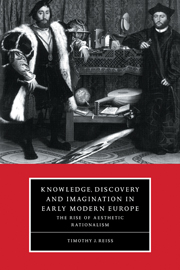Book contents
- Frontmatter
- Contents
- Prologue and acknowledgements
- A note on the text
- Introduction
- Part 1 Problematizing the language arts
- Part 2 Passages
- 3 Rhetoric and politics
- 4 Method and knowledge
- Part 3 Mathematics, music and rational aesthetics
- Bibliography
- Index
- CAMBRIDGE STUDIES IN RENAISSANCE LITERATURE AND CULTURE
3 - Rhetoric and politics
Published online by Cambridge University Press: 01 February 2010
- Frontmatter
- Contents
- Prologue and acknowledgements
- A note on the text
- Introduction
- Part 1 Problematizing the language arts
- Part 2 Passages
- 3 Rhetoric and politics
- 4 Method and knowledge
- Part 3 Mathematics, music and rational aesthetics
- Bibliography
- Index
- CAMBRIDGE STUDIES IN RENAISSANCE LITERATURE AND CULTURE
Summary
Bovelles ended his De differentia by remarking that when all was said and done to compare Latin with its vernaculars was an unrewarding exercise and to argue about it senseless. After all, Latin itself was presumably a vernacular to a previous language, in a regression that could cease only with that spoken by Adam and Eve: a language that might be re-learned only in the last days of the world. To seek origins in these decayed times was futile. One could only attend to how languages functioned now for their users. Contemporary Latin and contemporary vernaculars could tell us something about meaning and communication, and about their own organizing principles. To look for absolute rules beyond them was idle speculation. These ideas epitomized the sense that there was no surcease to that accumulation of levels of interpretation and meaning we have seen in vernacular grammatical explorations.
Valla and Perotti would not at all have dissented from this view of the limits and purpose of grammatical study and teaching. For a good halfcentury or more, indeed, a similar view was common to almost all areas of linguistic attention. Erasmian copia, one is inclined say, turned it to advantage, idealizing potentially unlimited multiplication and diversity of meanings. In this era, northern humanists especially, many have written, never wanted ‘to devise a single absolutely valid interpretation of a text but to collect all remotely plausible ones’.
- Type
- Chapter
- Information
- Knowledge, Discovery and Imagination in Early Modern EuropeThe Rise of Aesthetic Rationalism, pp. 73 - 100Publisher: Cambridge University PressPrint publication year: 1997
- 1
- Cited by



